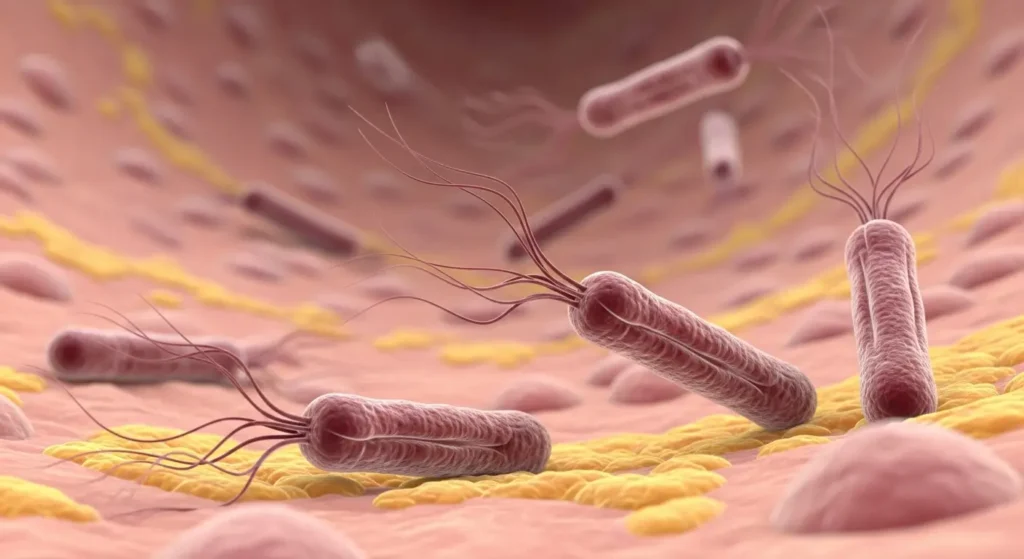Are you losing hair and wondering if your stomach issues might be related? Many people ask, Can H. pylori cause hair loss, Research suggests there may be a connection.
This article breaks down the science, explores possible mechanisms like nutrient deficiencies, and shows what treatment may mean for regrowth. By the end, you’ll have expert-backed clarity, practical steps, and reassurance on when to seek help.
What Does Research Say About H. pylori and Hair Loss?

Case Reports
One of the most compelling stories comes from a documented case report where a woman with alopecia areata (an autoimmune form of hair loss) experienced complete regrowth after H. pylori eradication. Her progress was tracked for 44 weeks, showing steady regrowth after treatment.
Case-Control Studies
Several studies have examined whether people with alopecia areata are more likely to have H. pylori infection:
- Egyptian study (2017): Higher prevalence of H. pylori in alopecia areata patients compared to controls.
- Other case-control trials: Some found no significant association, suggesting the link may vary by population or study design.
Systematic Reviews
A meta-analysis suggested that H. pylori infection may increase the risk of alopecia areata by about 57% (OR ~1.57). However, the review also noted limitations, such as small sample sizes and varying diagnostic methods.
Takeaway: The evidence is intriguing but not conclusive. Some individuals may benefit from treatment, while others see no direct effect on hair.
Why the Evidence Is Inconclusive (and Where We Can Improve)
- Small sample sizes: Most studies included fewer than 100 participants.
- Geographic limitations: Data often come from specific regions (the Middle East, the Mediterranean) with higher H. pylori prevalence.
- No long-term follow-up: Few studies tracked patients after successful treatment.
- Immune mechanism gaps: Theories include:
- Molecular mimicry – bacteria may trigger an immune response that mistakenly targets hair follicles.
- Chronic inflammation – H. pylori causes systemic immune activation that may worsen autoimmune conditions.
How H. pylori Might Indirectly Affect Hair Health
Even if H. pylori doesn’t directly attack hair, it can indirectly contribute to thinning or shedding through nutrient deficiencies and inflammation.
Iron Deficiency and Anemia
H. pylori can damage the stomach lining, leading to atrophic gastritis, which impairs iron absorption. Chronic iron deficiency is a well-known cause of diffuse hair thinning.
Vitamin B12 Malabsorption
Long-term infection may reduce stomach acid and intrinsic factor, impairing B12 absorption. B12 deficiency not only affects energy levels but can also lead to hair loss and brittle hair.
Chronic Inflammation and Autoimmunity
Persistent immune stimulation can increase oxidative stress and inflammatory cytokines, which may worsen conditions like alopecia areata.
Pro Tip: If you have both unexplained hair loss and fatigue, testing iron and B12 levels can provide important clues.
What You Can Do If You’re Experiencing Hair Loss
When to Test for H. pylori
Consider testing if you have:
- Chronic stomach pain or bloating
- Indigestion or acid reflux
- Unexplained iron or B12 deficiency
- Recurrent nausea or loss of appetite
Common tests include stool antigen, urea breath test, and endoscopy with biopsy.
What a Typical Eradication Protocol Looks Like
Most patients are treated with a triple therapy (proton pump inhibitor + 2 antibiotics for 10–14 days). In resistant cases, a quadruple therapy is used.
Monitoring Results and Hair Regrowth
- Weeks 0–4: GI symptoms may improve, and labs stabilize.
- Weeks 8–16: Some patients report reduced shedding.
- Weeks 16–44: Possible regrowth in autoimmune cases (based on case reports).
Comprehensive Approach
Since hair loss often has multiple causes, combine treatment with:
- Dermatology consultation for proper diagnosis
- Nutritional evaluation (iron, B12, vitamin D, thyroid)
- Stress management and lifestyle optimization

FAQs
Does H. pylori always cause hair loss?
No. Most people with H. pylori infection do not experience hair loss. It may only play a role in individuals with nutrient deficiencies or autoimmune predisposition.
Can treating H. pylori regrow hair?
In rare cases (like alopecia areata), regrowth has been reported after eradication. However, it’s not guaranteed.
Should everyone with hair loss get tested for H. pylori?
Not necessarily. Testing is most useful if you also have GI symptoms or unexplained anemia.
How long after eradication might hair come back?
Case reports suggest improvement within 4–16 weeks, with complete regrowth possible over several months.
Is the connection between H. pylori and hair loss widely accepted?
No. It remains a developing area of research. Dermatologists and gastroenterologists recommend a case-by-case approach.
Take Your Next Step
If you’re struggling with unexplained hair loss, it’s important to rule out hidden causes like nutrient deficiencies or infections. Our specialists combine advanced diagnostic testing with personalized hair restoration solutions.
👉 Book a consultation with Dr. Rana Irfan in Islamabad today to discover the root cause of your hair loss and explore proven treatment options.
